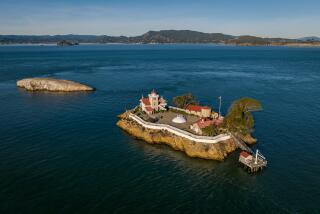Shifting With the Canadian Tides
- Share via
The sounds of a boisterous party rolled up the stairs of the Marathon Inn like a mighty tide, rising higher and higher in pitch and volume.
I pulled up the bedcovers, there in Room 2, and peered out toward the Bay of Fundy, which beats against this Canadian island called Grand Manan. The wind had calmed since supper. The great white ferryboat--the link to mainland New Brunswick--was tied up for the night.
I drifted back to sleep, pleasantly tired from an afternoon of hiking over cliff-top trails to see herring weirs just offshore and red-and-white lighthouses--telltale signs of Atlantic Canada.
The downstairs party was over by the next time I stirred, but the memory lingered on for innkeeper Jim Leslie.
“I tried to keep it down,” he said at breakfast, “but there must have been 100 people in here. We had two birthday parties and one going-off-island party. Everybody was singing chanteys and toasting everybody else.”
He reached for a mug of coffee.
“To top it off, the seiner fleet came in and the seiners are the big spenders,” he continued. “We’re the only watering hole on the island. They were sure all here last night.”
“Is Friday the big night for the pub?” I asked.
“Wednesday, Thursday, Friday and Saturday are our big nights,” Leslie said. “Monday and Tuesday can be slow.”
The Marathon Inn was built more than a century ago by a retired sea captain. The original gabled structure, with its pitched roof and floors that creak like a wooden ship, has eight guest rooms, some with private baths.
Next door, near a patch of wild blackberries, is a white-frame annex with 20 bedrooms. The inn stands above the harbor at North Head, one of three villages on this island that sits only six miles from Maine.
Fog and Fundy tides--the greatest in the world--rule life on Grand Manan. The main business is fishing; working hours shift with the sea.
“Some days you see all these fishermen lounging around the island and you wonder about their ambition,” Leslie said. “But they’ve been working at night. You can’t take a boat out at dawn if it’s toppled over in the mud because the tide’s out.”
No one seems to rush on Grand Manan. The island pace holds gentle even in summertime, when boatloads of day-trippers come to watch the antics of rare North Atlantic right whales.
Among its modern conveniences, the Marathon Inn boasts a fax machine. But when I inquired about a message, the girl at the desk replied: “I’ll have to call my baby-sitter. The fax is at my house.”
That reminded Leslie of a couple of years ago, during major remodeling, when the inn’s reservations system became a little haphazard.
“A lady from London phoned to see if we had a room for a week,” he said. “A carpenter answered and said he wasn’t sure. But he jotted her phone number on a 2-by-4 and, sure enough, in a day or two, he remembered to tell us.”
This is the first year that the Marathon Inn will remain open in the winter. Leslie is curious to see how many bird watchers, beachcombers, hikers, rock hounds and dedicated collectors of islands will come in the off-season.
Fresh seafood is always on the menu, he promises, and the brave can try the local pungent seaweed called dulse.
I had heard that there are few secrets on the island, which claims to have about the same population as a century ago: 2,500.
On the day of my departure, a local hailed me with proof.
“You were certainly up early this morning,” she said merrily.
“I saw you everywhere. Why, you walked by my house on Whale Cove Road before 8:30 a.m. I guess you were going to see Pam Cronk’s hand-knit sweaters. They’re beautiful. Too bad she was away. She’s due back tonight at 6. Well, at least you saw the old cemetery and the wildflowers. Hope you found what you wanted at the store.”
No woman is an island, or so I am told, but that one came pretty close.
More to Read
Sign up for The Wild
We’ll help you find the best places to hike, bike and run, as well as the perfect silent spots for meditation and yoga.
You may occasionally receive promotional content from the Los Angeles Times.




